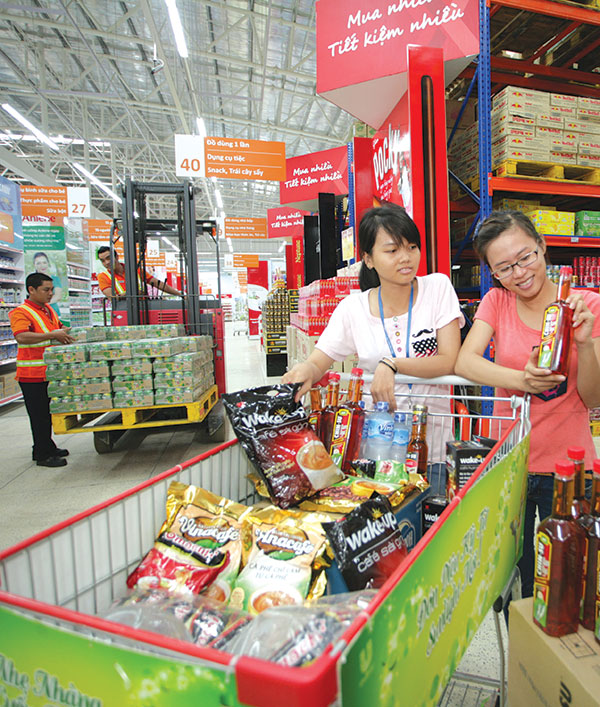AEC promises retail rivalry

Southeast Asian retail firms are eyeing entry into the Vietnamese market Photo: Le Toan
Vu Vinh Phu, chairman of Hanoi Supermarket Association told VIR that scores of foreign retailers, including those from Thailand had recently entered the market on anticipation of the establishment of the ASEAN Economic Community (AEC) by 2015.
“Once AEC becomes a reality, enterprises in ASEAN would have more sale and business opportunities as there will be greater regional economic integration and market convergence. Thai investors are well-known for their marketing capacity and are anticipating these opportunities,” Phu added in his additional position as vice chairman of the Association of Vietnam Retailers.
AEC is likely to attract further foreign investors to Vietnam eager to make the most of tariff advantages, he added.
According to the AEC Blueprint, a single ASEAN market and production base will be established, making ASEAN more dynamic and competitive thanks to the free flow of goods, investment, skilled labour and easier capital flows. Goods will also cross borders more easily thanks to zero per cent tariffs and the substantial dismantling of other trade barriers.
Central Group, Thailand’s leading retailer recently announced its expansion in Vietnam with next month’s launch of a Robins department store.
The first Robins store, the group’s first international branch, will occupy 10,000 square metres of retail space at Royal City in Hanoi. A second Robins store in Ho Chi Minh City will be opened by the end of 2014. The two stores will together hire 1,000 local workers.
Thai billionaire Dhanin Chearavanont, chairman of Charoen Pokphand Group (CP Group) was recently rebuffed by German retailer Metro Group AG in negotiations to buy Metro Cash and Carry in Vietnam, in a deal that was valued at more than $500 million. CP may well return to the table with an improved offer.
Korsak Chairasmisak, managing director of CP, said that Thailand wanted to take advantage of AEC. CP anticipated promoting small and medium-sized Thai enterprises to the wider ASEAN market.
Thailand’s Berli Jucker (BJC), owned by billionaire Aswin Techajaroenvikul, also previously bought the Vietnamese Family Mart’s 42 retail outlets to establish a joint venture with Vietnam’s Phu Thai Group. Phu Thai and BJC recently launched B’mart, with Phu Thai saying that details of the deal would officially be released in September this year.
In December 2012, BJC hooked up with Mongkol Group in a $32.4 million joint venture to set up Thai Corporation International Vietnam (TCI) to open a supermarket chain in Vietnam.
TCI director Mongkol Banthrarungroj said the joint venture’s target was to promote its brand name in Indochina and export Thai products to Myanmar, Laos, Cambodia and Vietnam. TCI expected to increase its sales in Vietnam to VND3 trillion ($150 million) once AEC becomes operational.
Marketing communications and management consultancy company AT Kearney in a recently survey of corporate leaders on their AEC expansion, merger and acquisition and brand plans found that the majority of companies in ASEAN member countries such as Thailand, Singapore, Malaysia, the Philippines and Vietnam planned to enter new markets, and create new products and brands to reach more consumers across the economic community after 2015.
“There is a big opportunity for Southeast Asian companies to embrace the ASEAN mantle and create regional brands,” said Bob Hekkelman, Southeast Asia CEO for world leading marketing firm JWT. He added that companies with insight into local tastes, cultures and attitudes had an inside track, but they would need to work hard to expand their reach, up their quality and build competitive brands if they want to woo the region’s discerning consumers.
Phu added that besides AEC, thanks to Vietnam’s WTO commitments, from January 11, 2015, Vietnam would permit the establishment of 100 per cent-invested retail businesses. Currently, foreign firms are constrained by being forced to enter into joint ventures with Vietnamese partners or franchising.
“AEC and WTO will provide opportunities, but also major challenges due to competition with foreign players,” said Phu.
Phu recommended domestic retail enterprises to enter partnerships to build bigger firms in anticipation of a massive influx of foreign retailers following the further opening of the retail market to foreign investment.
What the stars mean:
★ Poor ★ ★ Promising ★★★ Good ★★★★ Very good ★★★★★ Exceptional
Latest News
More News
- Hermes joins Long Thanh cargo terminal development (February 04, 2026 | 15:59)
- SCG enhances production and distribution in Vietnam (February 04, 2026 | 08:00)
- UNIVACCO strengthens Asia expansion with Vietnam facility (February 03, 2026 | 08:00)
- Cai Mep Ha Port project wins approval with $1.95bn investment (February 02, 2026 | 16:17)
- Repositioning Vietnam in Asia’s manufacturing race (February 02, 2026 | 16:00)
- Manufacturing growth remains solid in early 2026 (February 02, 2026 | 15:28)
- Navigating venture capital trends across the continent (February 02, 2026 | 14:00)
- Motivations to achieve high growth (February 02, 2026 | 11:00)
- Capacity and regulations among British areas of expertise in IFCs (February 02, 2026 | 09:09)
- Transition underway in German investment across Vietnam (February 02, 2026 | 08:00)
















 Mobile Version
Mobile Version